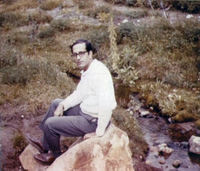
Ramallah, Palestine | Unknown - Unknown
Hanna Mikhail, also known as Abu Omar, was born in Ramallah, Mandatory Palestine, in 1935. He hails from a Christian family that was part of the Quaker community in Ramallah, and he is a cousin of Hanan Ashrawi. Mikhail's educational journey began at the Friends School in Ramallah, where he received a scholarship to study in the United States. He obtained a degree in chemistry from Haverford College and later earned his Ph.D. in political science from Harvard University. His doctoral thesis, "Politics and Revelation: Mawardi and After," was published by Edinburgh University Press in 1995, with a preface by Edward Said. After graduating, Mikhail joined Princeton University as a lecturer and later taught at the University of Washington. However, in the summer of 1969, he left his academic career and settled in Jordan, where he became an active member of the Fatah movement. Mikhail was part of the group's left wing and played a significant role in forming the Palestine Liberation Organization's (PLO) international relations and information departments. He served as a spokesperson for Fatah, accompanying foreign journalists to refugee camps and military bases. Mikhail also collaborated on producing an Italian film about the Palestinian resistance, scripted by Romano Ledda and Wael Zwaiter. Additionally, he organized various conferences, festivals, and committees, actively managing the International Solidarity Camp in Amman to foster relations between Western Europeans and Palestinian revolutionaries. After the Black September events in 1971, Mikhail and other PLO members relocated to Beirut. There, he served at the PLO's Palestinian Research Centre and the Planning Centre and was a member of the editorial board of Shu'un Filastiniyya. He also acted as an information adviser to PLO leader Yasser Arafat. Unfortunately, much of Mikhail's scholarly work was destroyed during the Israeli invasion of Beirut in 1982. In July 1976, Mikhail was sent by Yasser Arafat to investigate turmoil in a refugee camp in Tripoli. Accompanied by nine PLO members and two sailors, their fiberglass boat went missing off the coast of North Lebanon, and no further news of them was ever received. It is believed that they were either arrested and murdered by the Phalange forces or handed over to the Syrians. Despite extensive investigations by the International Committee of the Red Cross, no conclusion was reached regarding their fate. The PLO posthumously honored Mikhail with the title of martyr. Mikhail's life and disappearance were commemorated in Jean Genet's "Un captif amoureux" and in a seminar at Birzeit University on the 40th anniversary of his disappearance. His legacy remains a testament to his contributions as an intellectual and revolutionary committed to the Palestinian cause.